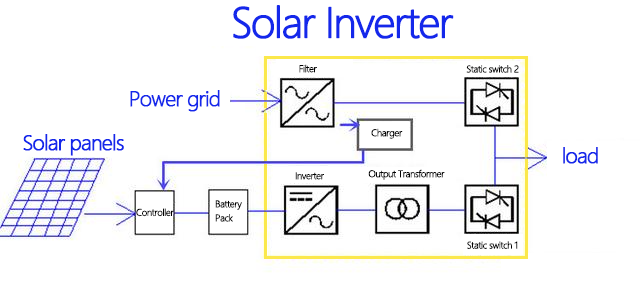How Does a Solar Power Inverter Work? A Complete Guide
In today's push for renewable energy, solar power has become one of the leading solutions for clean and sustainable electricity. But an essential component often overlooked is the solar power inverter — the device that makes solar energy usable for homes and businesses.
So, how does a solar power inverter work exactly? Let’s break it down.

What Is a Solar Power Inverter?
A solar power inverter is a device that converts direct current (DC) electricity generated by solar panels into alternating current (AC) electricity.
Most household appliances and the electrical grid use AC, making the inverter critical for any solar power system.
The Working Principle of a Solar Power Inverter
Here’s a simplified step-by-step explanation:
Solar Panels Generate DC Electricity
Solar panels absorb sunlight and convert it into DC electricity. However, DC power isn’t suitable for typical home appliances.DC to AC Conversion
The solar inverter takes the DC electricity and uses a series of electronic circuits and transformers to convert it into AC. This process often involves high-speed switching devices like IGBTs (Insulated Gate Bipolar Transistors) to efficiently manage the conversion.Synchronization with the Grid
If your system is connected to the local power grid (a grid-tied system), the inverter synchronizes the output AC electricity with the grid's voltage and frequency. This ensures smooth integration and the possibility to feed excess energy back to the grid.Monitoring and Protection
Modern inverters also monitor the system’s performance, provide data analytics, and offer protection features such as overload, short-circuit, and anti-islanding protection for safety.
Types of Solar Power Inverters
There are several types of inverters to suit different solar applications:
String Inverters: Used in residential and small commercial systems where multiple panels are connected in series.
Microinverters: Installed on each solar panel for maximum efficiency and better performance under shading conditions.
Hybrid Inverters: Combine solar and battery storage management, ideal for systems that store energy for later use.
Central Inverters: Large-scale units used in utility-grade solar farms.
Why Is the Inverter So Important?
Without the inverter, solar energy would remain trapped as DC power — unusable for powering your home or business.
A high-quality inverter ensures:
Maximum energy harvest
High efficiency
Reliable safety mechanisms
Smooth communication with smart grids and batteries
Choosing the right inverter is just as important as selecting quality solar panels.
Choose Reliable Inverters from Amensolar
When it comes to performance, durability, and advanced features, Amensolar offers a range of cutting-edge solar power inverters tailored to different system sizes and needs. Whether you are setting up a residential rooftop system or a commercial solar farm, Amensolar's inverters provide high efficiency, robust safety features, and smart monitoring options to maximize your investment in solar energy.

 N3H-X16US 16KW | Split Phase |...
N3H-X16US 16KW | Split Phase |...  N3H-X12US 12KW | Split Phase |...
N3H-X12US 12KW | Split Phase |...  N3H-X10US 10KW | Split Phase |...
N3H-X10US 10KW | Split Phase |...  N3H-X8US 8KW | Split Phase | ...
N3H-X8US 8KW | Split Phase | ...  N3H-X5US 5KW | Split Phase | ...
N3H-X5US 5KW | Split Phase | ...  N1F-A3US 3KW | Split Phase | ...
N1F-A3US 3KW | Split Phase | ...  N1F-A12US 12KW | Split Phase |...
N1F-A12US 12KW | Split Phase |...  N1F-A6.5US 6.5KW | Split Phase ...
N1F-A6.5US 6.5KW | Split Phase ...  N1F-A6.2P 6.2KW | Single Phase...
N1F-A6.2P 6.2KW | Single Phase...  N1F-A6.2E 6.2KW | Single Phase...
N1F-A6.2E 6.2KW | Single Phase...  AMF16000 51.2V | 16KWH | Floo...
AMF16000 51.2V | 16KWH | Floo...  AMW10240 51.2V | 10.24KWH | W...
AMW10240 51.2V | 10.24KWH | W...  LFP 16kWh / LV 51.2V | 16KWH | Floo...
LFP 16kWh / LV 51.2V | 16KWH | Floo...  S52300 51.2V | 16KWH | Stac...
S52300 51.2V | 16KWH | Stac...  S52200 51.2V | 10.24KWH | S...
S52200 51.2V | 10.24KWH | S...  AML12-200 12.8V Series LifePo4...
AML12-200 12.8V Series LifePo4...  AML12-100 12.8V Series LifePo4...
AML12-100 12.8V Series LifePo4...  AML12-120 12.8V Series LifePo4...
AML12-120 12.8V Series LifePo4...  AML12-150 12.8V Series LifePo4...
AML12-150 12.8V Series LifePo4... 